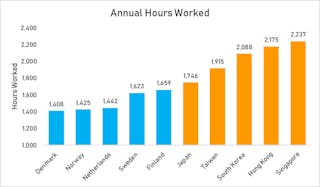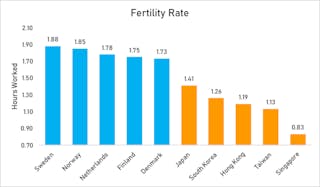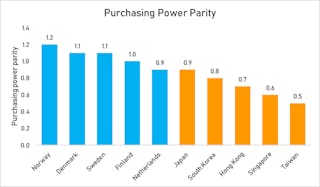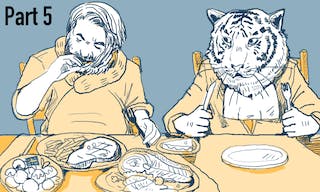What you need to know
Taiwan has outgrown its current economic strategy and needs to move up the value chain to become more like the Nordic countries and the Netherlands.
This is the final part of a 5 part series. You can start with part 1 here.
Equality and the future
There is an important area in which East Asian countries still have not caught up and perform poorly as a whole – work hours and off days.

Source (data from latest year): The Conference Board.
In terms of work hours, Singaporeans work the longest among the developed countries – 2,237 hours annually. People in Hong Kong work the second-longest, at 2,175 hours, while South Korea comes in third at 2,088 hours. Taiwanese endure long hours as well, but not to the same extent as their counterparts in the other Asian Tigers do, clocking in 1,915 hours per year.
Japan fares a bit better but it is the Nordics that shine – after the Germans, the Danes, Norwegians and Dutch work the shortest hours in the world.

It would also be reasonable to conclude that the situation for low-income workers in Singapore is completely out of whack – they earn comparatively low wages, work long hours and can only take short breaks, but suffer from scant social protection. Workers have limited protection from unemployment.
Singapore's harsh inequality therefore also results in the country having one of the lowest purchasing powers (as measured by purchasing power parity) when compared with the high-income countries. Even though Singapore has one of the highest GDPs per capita in the world, because the wage share is low and inequality is high, wages are therefore relatively low. This, coupled with being the most expensive place to live in the world, equates to low purchasing power. If it is of any consolation to Singaporeans, Taiwan has a lower purchasing power, though Taiwan's redeeming feature is that it has a stronger social welfare system. On the other hand, precisely because the Nordics have one of the highest GDPs per capita in the world, and these countries have a high wage share and the lowest income inequality in the world, they therefore also have the highest purchasing power in the world after Switzerland and Australia, and enjoy a high standard of living that is only available to the rich in Singapore and Hong Kong.

Singapore's socio-economic structure embodies many of the fundamentalist views on eugenics expressed by Singapore's first prime minister Lee Kuan Yew. In 1969, the late Lee said in parliament: "free education and subsidized housing lead to a situation where less economically productive people in the community are reproducing themselves at rates higher than the rest."
In 1980, as the birthrate among women who were more educated fell faster than that of those who were less educated, Lee then said: "If we continue to reproduce ourselves in this lop-sided way, we will be unable to maintain our present standards. Levels of competence will decline. Our economy will falter; and administration will suffer; and society will decline."
The irony is that it is these very beliefs that have resulted in Singapore developing along such unequal lines. Singapore's government has implemented these ideas to their full extent, treating the poor with contemptible disdain. If "society will decline" – as Lee put it - then it is because of his own ideals. By marginalizing the poor and denying them opportunities to move up the social ladder – Singapore's social mobility is low because of its inequality – the Singapore government reinforces structural poverty. The poor cannot move up not because they do not want to, but because they are not allowed to. The examples of the Nordics show that that where resources are distributed equally and everyone is uplifted as a whole, society progresses together. Whether or not the current leaders in Singapore subscribe to the late Lee's views, they have continued to indulge them.
In truth, it is not because people are "less educated" that makes them poor, it is their poverty that makes them "less educated." A study in the American Journal of Preventive Medicine found that people who are consistently exposed to having low incomes for two decades showed worse cognitive function and intelligence levels, and that living in poverty and hardship also meant a higher possibility of premature aging.
Research from Princeton University also found that people who are poor are not less capable because of any inherent traits but because poverty impedes their cognitive capacity. The researchers explain: "Poverty and all its related concerns require so much mental energy that the poor have less remaining brainpower to devote to other areas of life."
The researchers go on: "Thusly, a person is left with fewer mental resources to focus on complicated, indirectly related matters such as education, job training and even managing their time." As a result, the poor "make mistakes and bad decisions" because they are poor – and must spend too much time thinking about how to make ends meet. It might take having to fall into poverty for people to really appreciate what this means.
But the study also shows that when people are lifted out of poverty, "low-income individuals performed competently, at a similar level to people who were well off," then doctoral student and co-author Jiaying Zhao explains. As such, people who are considered intelligent now but who are made to live in poverty can also become less intelligent, when their resources are constrained. It is not a zero-sum game and definitely does not conform to the eugenics ideology expounded by the late prime minister.In sum, our society can be smarter as a whole when people are paid higher wages, and when resources are more equitably distributed to let everyone have the same chance. Unfortunately, the ruling People's Action Party appears too deeply embroiled in the situation to pull itself out and Singaporeans are too fearful – or complacent – to do anything about it.
Taiwan's future
Taiwan, on the other hand, by its metrics, has a relatively strong social welfare system, with high adequacy in unemployment benefits and gross pension replacement rates, as well as healthcare that is generally cheap.
However, the key issue with Taiwan is low wages, which drag down Taiwan's otherwise strong social welfare system. It has thus become commonplace to read reports or hear government officials talk about how the national health insurance or pension system might go bankrupt, but this neglects the wage issue, which results in lower contributions to Taiwan's social welfare system.
But Taiwan is on the crux of change. Should the country continue down the misguided path of neoliberalism and inequality, which even the IMF is now cautioning against, or focus on pursuing progressive ideals as part of its democratic evolution?
When Taiwan's President Tsai Ing-wen (蔡英文) was elected, she promised to increase workers' wages.
"Our young people still suffer from low wages. Their lives are stuck, and they feel helpless and confused about the future," she said.
Indeed, Commonwealth Magazine wrote about the 30-somethings in Taiwan who grew up during as wages became depressed, and because of that, Lin Thung-hong, an associate research fellow in Academia Sinica's Institute of Sociology, explains, "(Living in the moment) is rational behavior when wages are low because saving doesn't have any benefits."
Therefore, when Hsu Chung-jen (徐重仁), president of PX Mart, one of Taiwan's largest supermarket chains, complained that Taiwan's youths were "spending too much money" and that they should "tolerate rather than complain about low pay," he could not be more out of touch.
"Nowadays, young people are really spendthrift," Hsu said, "Young people should not fuss over having lower salaries than other people. Withstand rather than complain; work diligently and your boss will see you one day." But have the bosses of Taiwan met his expectations?
Hsu later apologized, saying "the incident led him to reflect whether he — and those of his generation — tend to pass judgement too quickly on the younger generation," Taipei Times reported him as saying.
Perhaps Hsu might not be completely to blame for his lack of understanding. As in Singapore, the rich-poor gap in Taiwan has also resulted in a separation of experience and understanding, where "the Elites – due to their wealth – do not suffer the detrimental effects" of inequality and "appear to be oblivious" to the plight of those at the bottom, as a study on collapsed societies explains.
Taiwan and Singapore are of course different – Taiwan is a democracy where its citizens have the right and ability to push for change. In Singapore, activists have been intimidated, interrogated, sued, charged and jailed, while some have lost their jobs simply for speaking up – just like in China.
Taiwan president Tsai also said at her inauguration: "Young people's future is the government's responsibility. If unfriendly structures persist, the situation for young people will never improve, no matter how many elite talents we have. My expectation is that, within my term as president, I will tackle this country's problems step by step, starting with the basic structure."
Compare this with Singapore's Prime Minister Lee who mocked income inequality as a "fashionable thing to talk about."
He also said: "If I can get another 10 billionaires to move to Singapore and set up their base here, my Gini coefficient will get worse but I think Singaporeans will be better off, because they will bring in business, bring in opportunities, open new doors and create new jobs, and I think that is the attitude with which we must approach this problem."
Well, statistics suggest otherwise.
President Tsai also campaigned on a platform of marriage equality in the last general election, yet her administration has dragged its heels on following through. Premier William Lai (賴清德) said in October last year that the Legislative Yuan was still working on submitting a proposal on marriage equality for discussion before the end of 2017 but we are now into the new year, and not a sound has been heard. Nonetheless, Taiwan remains the only Asian country which has a road map towards marriage equality by the middle of 2019 – putting it in the same league as the Nordics and the Netherlands, even as its East Asian counterparts remain nonplussed by the issue.
| Same-sex marriage recognition (year of legalization) | No same-sex marriage recognition | Criminalization of male same-sex sexual relationships |
| Netherlands (2001) Norway (2009) Sweden (2009) Denmark (2012) Finland (2017) | Japan (partnership certificates issued in six local governments) Hong Kong South Korea | Singapore |
In Singapore, after a record number of international corporate sponsors joined in the eighth run of the annual PinkDot event in 2016, held in support of the Lesbian, Gay, Bisexual and Transgender (LGBT) community, the government announced that foreign entities would not be allowed to sponsor the event unless they apply for permission. Even then, Google, Apple, Facebook, Salesforce, Airbnb, Uber, Microsoft, NBC Universal and Goldman Sachs did just that, but had their applications rejected. The government also introduced new rules to prohibit foreigners from participating or to sponsor the event. Those deemed to be illegally participating can be fined while organizers are threatened with fines and jail time if they flout the rules.
However, the ban has had the opposite effect – more than 100 local companies then stepped up to provide sponsorship for the event. Still, male same-sex sexual relationships are still illegal even though the ILGA-RIWI Global Attitudes Survey on Sexual, Gender and Sex Minorities released last year showed that 61 percent of Singaporean participants believe that equal rights and protections should be applied to people who are romantically or sexually attracted to people of the same sex – which was the second-highest acceptance level in Asia.
In Hong Kong, the High Court said in a landmark ruling last year that the government should provide the same benefits that it provides to heterosexual couples, to same-sex couples. Justice Anderson Chow Ka-ming (周家明) called the Civil Service Bureau's policy "indirect discrimination" – the bureau had denied benefits to senior immigration officer Leung Chun-kwong and his partner, Scott Adams from New Zealand, whom he married in 2014, claiming the need to protect "the integrity of the institution of marriage", leading Leung to challenge the bureau in court. However, the government has decided to appeal the ruling.
In South Korea, homosexual activity is banned in the military and after a video showing two male soldiers having sex was uploaded onto social media, human rights group reported a witch hunt against gay soldiers which even used dating apps to entrap them, leading to 32 soldiers being charged. The Associated Press also reported the South Korean President Moon Jae-in as opposing homosexuality.
On the other hand, in Japan, partnership certificates can be issued to same-sex couples in six local governments and the city of Sapporo, even though they are not legally recognized as marriage certificates. Attitudes towards homosexuality are said to be conservative, though the ILGA-RIWI survey also showed that 55 percent of participants believe that same-sex couples should be treated with equal rights and protections.
Overall, among the Asian Tigers, Taiwan is a mixed bag. On the one hand, wages are low but on the other, Taiwan has a good social welfare structural system and same-sex marriage will soon be legal in the next one and a half years at most. It seems almost as if the Taiwanese government is pushing all the right buttons except the most important one – wages (and related to it, rest days).
Vice Premier Shih Jun-ji did discuss the possibility of increasing wages by 6 percent every year to achieve a minimum wage of NT$30,000 (US$1,021) by 2024, or by 8 percent to achieve it by 2022. However, Shih's calculations do not take into account the inflation rate, which in 4 years time might mean minimum wage should have gone up to NT$32,000 (US$1,089), which would mean that wages should be increasing by 9 to 10 percent every year – noting the study mentioned earlier which showed that a 10 percent increase would only lead to a 0.4 percent increase in overall prices and 4 percent in food prices.
Taiwan's government should come out with a projection as to the different scenarios that wages can be increased by, and how these would affect prices and employment, so as to come out with a practical solution.
Even so, Premier William Lai had side-stepped the topic of implementing a minimum wage of NT$30,000 even as he suggested that listed companies and multinational corporations should pay graduates a starting wage of NT$30,000. But a minimum wage policy is important as can be seen in the announcement of the Workforce Development Agency (WDA) annual career fair. At its upcoming fair, of the 3,500 jobs available, only half will have a starting salary of NT$30,000 per month. In spite of Lai's calling on businesses to increase starting salaries to NT$30,000, this call has not been heeded – which is why increasing minimum wage as a policy is necessary.
While NT$30,000 is not only the "ideal" minimum wage, it is also necessary to bring Taiwan's wages to parity. Taiwan's current minimum wage is only NT$22,000, but public sector workers already earn a minimum of NT$29,345 and with the pension reform last year public sector pensioners are also guaranteed a minimum pension payment of NT$32,160.
Clearly, the government acknowledges that NT$30,000 to NT$32,000 is the minimum necessary for basic living for the Taiwanese. Leaving private-sector workers in the lurch to earn only NT$22,000 and leaving it to the private sector to increase wages without legislating minimum wages to the ideal would be irresponsible.
In fact, when you take the example of Denmark and Sweden, public and private-sector workers earn about the same wages, and skilled private-sector workers actually earn higher wages than public-sector workers, so it begs the question why public sector workers in Taiwan are earning such significantly higher wages than private-sector workers. Shouldn't they be earning similar – and higher – wages if the Taiwanese are to be uplifted together? Which is why the continuous push by retired public servants to fight to keep their high pension payments – which already would put them in the top 10 percent income earners – is incredulous.
What kind of example are the public school teachers setting for their students when they would fight for their own pension and not for the general public, when the very people they teach would go out into the workforce to earn significantly lower pay than them? Already, public school teachers already received an average pension of NT$68,025 last year, or 18 times higher than the average pension of only NT$3,791 that 46 percent of Taiwanese retirees were able to receive. Shame is perhaps not the right word, but where we should work for the benefit of all of Taiwan, where is the self-respect of the public school teachers when their role should be to educate the public of their responsibility to society?
Shih also said that the government would adopt a targeted approach to increase minimum wages in industry sectors where wages are low such as in the retail and food industries, and where unemployment is high such as among young workers and first-time job seekers, instead of a "broad approach aimed at improving the entire economy."
But labor unions should take note – the Nordic example where collective bargaining is done for each sector actually helped to increase wages to the highest in the world, but that is because they are democracies. Taiwan may be a democracy, but it has not attained the level of transparency that the Nordics have and because the top families' control of businesses in Taiwan is similar to Singapore's top families' (and state's) control – and where crony capitalism is high. Taiwan might fall into a similar situation where wages would remain low as in Singapore's case, even if there were any increase. Where Taiwan will go depends on the integrity of Taiwan's politicians and their commitment to democracy, and the strength of the labor unions and the Taiwanese to hold the government accountable.
The World Economic Forum highlighted this: "Recent empirical research indicates that the most important explanation for the falling wage share is workers' weaker bargaining position."
It added that, "The conclusion is that it is absolutely possible to restore the wage share through the right policies, [… by] strengthening the welfare state, supporting trade unions and providing workers with […] a social safety net," among other things.
Additionally, the Nordic model has shown how high wages and a strong social welfare system can help design an ecosystem which has led the Nordic countries to be one of the most innovative in the world, and which has moved the Nordic countries into high-skilled and high-value industries.
At the very least, at her year-end conference, President Tsai did talk up her promise of setting a minimum wage act.
Tsai also said: "The government will provide support to companies willing to give bigger pay raises. When companies share more of their profits with employees, this increases employees' buying power, creating a positive cycle that benefits both enterprise and labor."
Tsai's point is backed up by evidence which showed that "the marginal propensity to consume of high-income earners is substantially less than for low-income earners," as reported by The Guardian of the study by Brookings Institution and the Reserve Bank of Australia.
GoBankingRates.com also showed that the richest 10 percent in America actually spends about the same on basic necessities as the rest of the 90 percent – US$1,601 vs US$1,455, respectively, but with the top 10 percent spending only 10 percent of their income. As such, Michael Linden of the Center for American Progress' managing director for economic policy told HuffPost: "It's a real problem to the extent that more and more income is going to people at the top and more of that income is not going to places that are productive."
Sam Pizzigati, an associate fellow at America's Institute for Policy Studies added that, "This whole hoarding episode [among the rich] just tells us once again that any society that lets wealth concentrate at the top is making a very foolish move economically."
"There's a bit of a vicious cycle," Linden said. And this is where Taiwan is today.
For too long, Taiwan's government has pandered far too much to the big businesses. This has resulted in a vicious cycle (恶性循环), as Tsai's proposal hopes to undo, or at least we hope it will. But this also requires the cooperation of the top families in Taiwan and the bosses of SMEs to understand the role they play not only as business leaders but as the citizens of Taiwan. If Taiwan is to become relevant on the international stage again, the Taiwanese have to first take themselves seriously and to uplift the livelihoods of one another, so that the Taiwanese will gain a new confidence and foothold and be able to take Taiwan forward together as a nation.
On many indicators, Taiwan already performs admirably – in terms of social welfare and human rights. But if Taiwan were to truly become one of the developed and democratic countries in the world, it has to start with wages – by increasing them.
The World Economic Forum explained: "Strong unions, collective wage bargaining and high minimum wages can offset the negative impact of other factors, as the Nordic countries have proved," which together can help design an ecosystem which has led the Nordic countries to be one of the most innovative in the world, and which has moved the Nordic countries into a high-skilled and high-value industry.
The solution therefore, is doable. Writing before the recently-concluded World Economic Forum Annual Meeting 2018, Executive Director of Oxfam International Winnie Byanyima said: "I will be urging political leaders [at the meeting] to limit rewards to shareholders and senior executives, introduce a statutory living wage, build fairer tax systems, invest in healthcare and education, and shepherd in a technological revolution that works for all. I will be calling on business leaders to stop paying huge share dividends and awarding bumper pay packages to top executives until they can guarantee that all of their workers are getting a living wage and that their suppliers in their supply chains are being paid fair prices."
The same needs to be done in Taiwan.
Already, Taiwan's low wages are causing Taiwanese youths to leave to seek higher paying jobs, ironically in China. Where Taiwan is losing talent, the other irony is that Taiwan's companies are still resistant to increasing wages while yet fretting about losing talent. In short, Taiwan's businesses cannot have their cake and eat it. If they want wages to be kept low, then they have to content with Taiwan losing its lead and the continued stagnation. Otherwise, Taiwan's businesses need to also increase wages to kickstart Taiwan's economy once again.
It is a misguided strategy to hope that Taiwan can be kept as a low-cost manufacturing hub to compete with countries like Vietnam or Cambodia. Like the World Economic Forum explained, Taiwan's government has to "avoid a prisoner's dilemma in which [they] suppress wages to gain a competitive advantage over others". Taiwan has outgrown this strategy and needs to move up the value chain to become more like the Nordic countries and the Netherlands. What it takes now is whether Taiwan's businesses – and the government – have the foresight and confidence to take the next step to bring Taiwan forward. This means investing in Taiwan's workers, to lift their wages, so that in turn they can help to lift local businesses.
Premier Lai had mentioned that in Taiwan, the "private sector is not short of funds, [however] much of it is invested overseas." If Taiwan's businesses would heed the government's call to channel the funds back to Taiwan, this could give Taiwan the much needed chance for change.
At this juncture, where the government's Southbound policy seems to be gaining traction, Taiwan's renewed collaborations with countries like Japan, Australia and India, as well as the United States and parts of Europe means that Taiwan can once again play a central role in the regional economy. Now all it takes is for the Taiwanese and Taiwan's businesses to believe in Taiwan's potential and to help bring Taiwan's hopes and possibilities to fruition.
The Taiwanese have to understand that the way for Taiwan to gain international recognition is not (just) for Taiwan to go around asking others to do so, but for Taiwan to build up its credibility once again, so that other countries will give Taiwan the respect it deserves because of the important role Taiwan would play on the international stage. To do so, Taiwan's local businesses have to understand their role in national building and help improves the lives of their workers - and the citizens of Taiwan – so that together, businesses and workers, and all of Taiwan, will brave the new world together and bring Taiwan to a whole new level. Our workers are our families, our country is our home.
Are we willing to look long term and work together for the future of Taiwan? This is a question for the Taiwanese to answer.
Where do we want Taiwan to go? And what are we willing to do for Taiwan?
Read next: It's Time to Return Taiwanese Workers What They Rightfully Earn
TNL Editor: David Green



